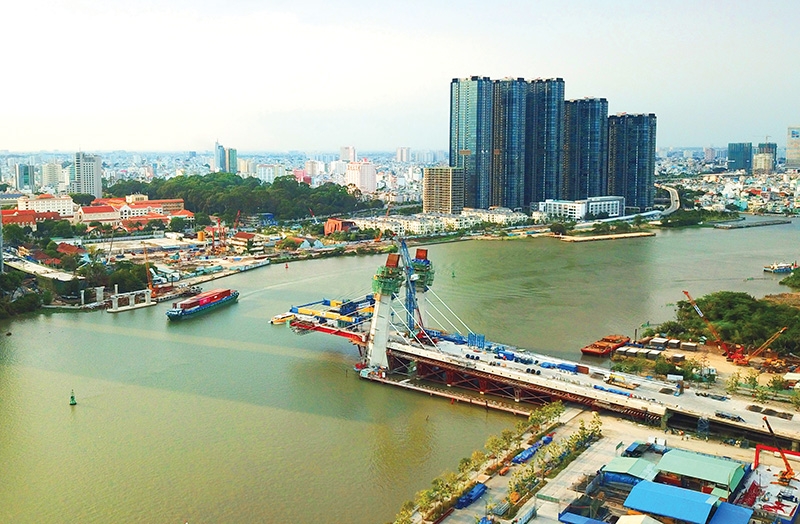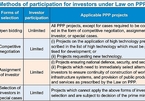 |
| The new PPP law promises to boost investment in infrastructure projects, photo Le Toan |
Do Van Nam, representing a group of public-private partnership (PPP) experts, said at a webinar last week that there are some long-standing issues in the guiding decrees that should be addressed.
“Lending and bank support should also be part of future decrees. There need to be specific regulations on loans to facilitate future PPP developments,” Nam recommended. “Banks hesitate to offer loans for these projects, some even refuse them straightaway.”
Going into the issue of special concern – retroactive risk-sharing arrangements – Tran Van The, deputy chairman of the Board of Directors at Deo Ca Group, said, “We have worked on a number of key national projects when there was no legal framework on the risk-sharing mechanism. We are suffering losses at some projects, which reduces our loan repayment capacity.” He suggested that there should be transitional provisions to enable them to enjoy the mechanism.
Vaibhav Saxena, attorney at Vietnam International Law Firm, quoted that the current investment law and the new Law on Investment 2020, which will take effect on January 1, 2021, provide favourable investment incentives and ensure security for the investors from changes in law circumstances, where if a new law provides less favourable investment incentives than those currently enjoyed by the investor, the investor can switch to the new incentives for the remaining duration of their original arrangements for the investment project.
Previously, PPP regime followed the investment law as the apex law to drive investment activities in Vietnam. However, the new law on PPP investment is now a comprehensive legislation to cover PPP related investment activities in Vietnam.
“The old investors having contracts signed may follow the Law on Investment which allows them to access new policy benefits, and the PPP law provides an option for the same. The Vietnamese government is working on this matter and the regulations guiding the new PPP law are expected to have clearer guidelines,” Saxena told VIR.
Under Article 101 of the new PPP law, the National Assembly assigns the government to give specific guidance on transitional provisions. As current rules dictate, risk-sharing allocation should be set out in the feasibility study. Thus, projects which had their investment plans approved without risk-sharing arrangements will face challenges in enjoying such a mechanism. This forces investors who require such an arrangement to redo their investment plans.
“Retroactive risk-sharing arrangements should be carefully considered on a case-by-case basis while taking into account the state budget,” cautioned Vu Quynh Le, deputy director of the Ministry of Planning and Investment’s Public Procurement Agency.
Under these rules, the eastern cluster of the North-South Expressway, which has five PPP sections, and many other projects cannot add risk-sharing allocations unless they redo the entire investment process – and hundreds of private firms are seeking for retroactive access to risk-sharing.
Despite this, it is worthy to note that risk-sharing mechanism, including minimum-revenue risk sharing, is one of the major changes in the new PPP law, showing a significant effort to improve the appeal of this investment mode amid budgetary constraints.
Available from early 2021, the new revenue-risk sharing mechanism will be restricted to only certain projects to ensure bankability.
For years, revenue-risk allocation in PPP initiatives has been a controversial topic because of their high risk of losses and the lack of a completed legal framework. Thus far, the power sector has been the most successful at attracting foreign investment in build-operate-transfer (BOT) projects, while others have seen failures.
Some BOT initiatives have hit the rocks for several years, including Dau Giay-Phan Thiet Expressway, Van Don-Mong Cai, and Trung Luong-My Thuan expressways. VIR
Tung Anh

Outlining the preferential mechanisms for new PPP projects
Public-private investment projects play a significant role in developing infrastructure and have the potential to accelerate large-scale construction works across the country.